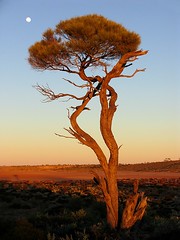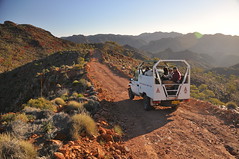![what you probably WON'T be seeing, wind turbines at starfish hill on the fleurieu peninsual - link to my 'an activ[ist] life' set on flickr](http://farm2.static.flickr.com/1041/1175352509_cc5edb755f_m.jpg) BHP Billiton has announced an astonishing projected requirement of electricity to power the expanded Roxby Downs mine - about half of the energy used by the entire state of South Australia!
BHP Billiton has announced an astonishing projected requirement of electricity to power the expanded Roxby Downs mine - about half of the energy used by the entire state of South Australia!Does anyone, outside the small arena of industry spruikers and anti-green zealots, still really believe that nuclear power is going to save us from the ravages of the global warming?
Roxby is easily the world's largest uranium mine, and to make it even bigger is going to require pushing unimaginable tonnages of CO2 into the atmosphere. Not to mention the establishment of a controversial desalination plant to cull water from the head of Spencer Gulf!
This demand is going to skew the economy of electricity production in South Australia for the remainder of the 21st Century. Where will energy investment now be focussed? The state government has set no requirement on BHP that it sources any of this massive increase from renewable sources. Our state leads Australia in the establishment of wind-farm projects. Adelaide is the only capital city participating in the current Solar Cities project. Left to our own devices who knows where we may have ended up as we made piecemeal progess to carbon-neutrality?
another dirty great power station?
But this huge surge in required production will predictably lead to a push to invest in another mega fossil-fuel power station - the state's third. Effectively squeezing out vital renewable technologies in the process.
Wind turbines and solar panels simply won't be able to provide such a huge volume of baseload power. While we have hot rocks aplenty this is still an unproven technology. This leaves only two options; firstly the state's gas fields in the far north-east as a dirty, but not perhaps filthy, fuel source to run the turbines. Or, scarily, we do just happen to have a lot of coal nearby! Dear old dirty, dirty coal freight-trained down from the demolition of a large swathe of the northern Flinders Ranges at Leigh Creek already powers the Playford power station at Port Augusta, current power provider to Roxby Downs.
So, in order to provide the allegedly 'clean, green' fuel that will power the future of the world we may be asked to build a giant coal-fired station! Or gas. Or both. This is before we even consider the carbon resources expended by the various massive machines required in the physical creation of what will be one of the world's largest holes in the ground.
Nuclear power is out, I might add. Not only is it politically unpalatable, as the previous federal government discovered to its cost, it's just too expensive and the stations take far too long to come on line.
And anyone suggesting that much-vaunted 'clean coal' technology may save the day is faced with admitting that this technology is also unproven, and may require a breathtaking 40% of the increased power demand again to run its own scrubbing operations.
an absurd addiction to the gigantic
The expansion of Roxby Downs is a great snapshot of the absurdity of our 'globalised' addiction to giantism. A gigantic economy with titanic power demands can only conceive of more super-scale solutions to the very problems that bloated excess and massive over-subscription to natural services has spawned in the first place. And all of the super-scale solutions happen to involved massive increases in carbon output that will allegedly facilitate a decrease one or two decades down the road. Despite growth forecasts making it highly unlikely the fossil fuels won't simply be burned anyway.
But do we even have one or two decades? Today I watched a video of a whole new chunk of Antarctic ice breaking off into the ocean and floating away, well ahead of any greenhouse schedule. I've just sweltered through the longest hot spell in my state's recorded history here in Adelaide - 15 days above 35°C (95°F), easily the hottest period ever recorded for an Australian capital. The nation's one major river system - the Murray/Darling - is in collapse, with drinkers, graziers and irrigators 'entitled' to more than double the actual amount of water that exists, and the lower lakes of my home state now likely to be dammed out of the freshwater system and then flooded with sea-water to allow resort residents to be able to step straight from their marinas and onto the decks of their cabin cruisers.
Forget the DotComs and the dodgily mortgaged US housing market - the globalised mega-market has been the greatest bubble in human history and is collapsing around us as we speak, at an economic cost that's yet to be determined, and a cost in natural capital that can only be compared to the impact of a comet strike. Mega-capitalism is functionally unable to conceive of any solution that does not perpetuate its own growth, and its media organs will never concede that such a possibility even exists. It's up to us to do that.
BHP to use half of state's electricity
Jeremy Roberts - Business, The Australian, March 27th 2008
BHP Billiton will need nearly half of South Australia's current electricity supply to power its vastly expanded Olympic Dam copper and uranium mine.
The mining company wrote to potential suppliers this month revealing that power demand for the mine was expected to top 690megawatts when it reaches full production in 10 years.
This 30 per cent increase on previous forecasts for the mine 600km northwest of Adelaide is equivalent to nearly 42 per cent of South Australia's total electricity consumption and nearly half of Adelaide's power supply.
An industry insider yesterday described as "staggering" BHP's new power needs, which exceed previous forecasts by 170mW.
It would require the building of new power stations in the state at a time when incentives for business to invest in traditional power generation are clouded by efforts to combat global warming.
The new BHP forecast comes a week after the Rudd Government's Garnaut report on greenhouse emissions recommended power generators not be compensated in a carbon trading scheme.
South Australia has been an importer of electricity for several years, and its power distribution system was stretched to capacity to meet demand during the record heatwave earlier this month.
BHP is the state's largest single power consumer, taking 120mW. The company will use the aditional 570mW to power on-site mineral processing to separate uranium, copper and gold, as well as for the expanded Roxby Downs township, a larger airport and the new open-cut mining operation.
The instability in the power generation sector adds to the challenges BHP faces in developing Olympic Dam.
A company spokeswoman yesterday described the request for 690mW of power as an estimate. "The expansion project remains in pre-feasibility and is yet to be approved," she said. But in correspondence to the state's power suppliers, dated March 5 and marked "commercial in confidence", BHP calls for expressions of interest to supply the power.
The correspondence was followed by in-person briefings on March 12, and asks suppliers to address three supply options: power generation at the Olympic Dam site, elsewhere in the state, or a combination of both.
The company says 60mW of the power would be used to run a desalination plant planned for the coast of the Upper Spencer Gulf, and to pump the water 320km north to Olympic Dam.
Providing the additional power within a 10-year timeframe will challenge South Australia's energy planners.
Gas-fired power stations normally take up to three years to build, industry sources said. Queensland's largest coal-fired power station, Kogan Creek in the western Darling Downs, which was opened last December, took four years to build.
Sourcing base-load renewable energy from "hot rocks" geothermal sources in the north of the state may become an option, but the technology has not yet been proved viable.
The South Australian Government has not imposed any mandatory requirements on BHP to source renewable energy.
South Australian Greens MP Mark Parnell said the lack of renewable energy sources for Olympic Dam would make the state a "greenhouse pariah".
"Our state risks being left with a huge carbon black hole as we become the greenhouse dump for one of the world's richest companies," Mr Parnell said.






![link to the u[n]sa homepage](http://users.chariot.net.au/~greenh/blog/unknownsa_ublog-text.gif)


![link to the u[n]sa features page](http://users.chariot.net.au/~greenh/blog/features_ublog-text.gif)
![link to the u[n]sa kangaroo island feature image pages](http://farm2.static.flickr.com/1306/1187313059_93fdefd86b_o.jpg)
![link to the u[n]sa katarapko creek / murray river np feature image pages](http://farm2.static.flickr.com/1435/1181073355_b5c45f799d_o.jpg)


!['constellation' - wild country [national] set on flickr](http://farm1.static.flickr.com/155/415123844_3e6da621e5_s.jpg)

!['the bay serene' - the wild west [coast] set on flickr](http://farm1.static.flickr.com/121/312226516_606ac35455_s.jpg)








![u[n]sa journal -thanks for your time! u[n]sa journal - thanks for your time!](http://users.chariot.net.au/~greenh/blog/journal_ublog-text.gif)
I hope BHP doesn't expect the state taxpayers to subsidise all this extra power! If the mine is such a sure thing they should generate it themselves, under stringent conditions we the taxpayers set! (like that will happen)
ReplyDeleteI note that Green Rock Energy is prospecting for hot rocks right next to Roxby - a nice fit if they can make it work. However, I believe they are looking at sub optimal heat sources and as Bill says, this is an unproven technology although a promising one (I'll declare my interest right here - I own shares in one of these hot rock companies).
I'm just as worried at the amount of water all this is going to use. Does anyone else sense a creeping normalisation of the desal rhetoric out there? (including new state government TV ads) You know - 'in the future we can get all the fresh water we want from desal, why didn't we think of that before, continue the party chaps!'
Apart from the 'business as usual' denial of our water crisis this represents, I have little faith in the energy sources used for these desal plants being anything like 'green'.
etc etc P
The comment about "normalisation" of desal rhetoric is an interesting one and something which has been on my mind for some time. I consider it inevitable that desal will be seen as the only way to drive the continuing growth of urban settlements and industrial processes... the real challenge will be how these desal processes are powered (surely not more carbon-based energy?!) and how the saline waste is managed. These are big challenges, obviously.
ReplyDeleteBHP expect a state subsidy for their business expenses, Phil? How could you even suggest it? For shame; we live in a global free-market, as the Bear-Stearns bailout clearly attests!
ReplyDeleteI think desal has indeed been dished up to us as 'inevitable' in much the same way as we've been buttered up for Nukes. All right-thinking people know it's the only way to sustain out lifestyles and move forward into a glorious future etc. etc.
And many have enough of an itch to keep mainlining the good-life that they're unlikely to argue. Certainly on the H2O minus the NaCl, anyway. On U308 > oodles of e- I think there's a lot more reservation, at least at the Nimby level. But if some bugger overseas shoves it in their reactor and we stand to make $squillions in the process then that's much more acceptable.
I just happen to believe this is all completely cock-eyed. Carbon outputs will continue to rise right along with the nuclear power stations and the windturbines delivering the 20%, 30% of sustainably-sourced power to the desal plants (Hell, we'll probably even do so well they'll be able to push it up another 5% 2 years ahead of schedule! And what a fine, heart-warming glossy brochure adorned with piping-shrike resplendent that will make...)
I'm reminded of the argument over Heathrow's putative third runway. Intelligent adults are discussing the possibility of developing 'super' aviation fuels with minimal carbon emissions as though they really hoped that, like in the old pantomimes, if you believe hard enough, it just might be true!
Though I clearly doubt it will achieve what it's exponents - including me - will publicly encourage people to believe it might I'm pragmatic enough to hope that at least there'll be enough public and political shame around to insist (along with Mark Parnell!) on constructing sufficient renewable resource electricity to fill the full-quota for any desal operation in SA. The more sane, useful infrastructure we can build in the dying throes of the global resource bubble the better...
The Perth desal plant - that's 100% wind-power, right?
Do you have any idea how much Olympic Dam Royalties help South Australia????? The state would be totally broke without Olympic Dam.
ReplyDeleteone could doubtlessly debate the costs to the state of hosting roxby versus the benefits, but this was hardly my point
ReplyDeletemy point - obvious to anyone who actually reads this piece - is about externalised costs to the community, such as the massive amount of CO2 this operation actually produces, despite loudly trumpeted claims of uranium mining and nuclear power saving the world from just such pollution
and, yes, i know it's not just a uranium mine! but that doesn't change the fact that it's a massive polluter...
just because one stands a chance of making money out of something one isn't then excused from thinking about the consequences of it - otherwise we'd all be heroin dealers, wouldn't we?